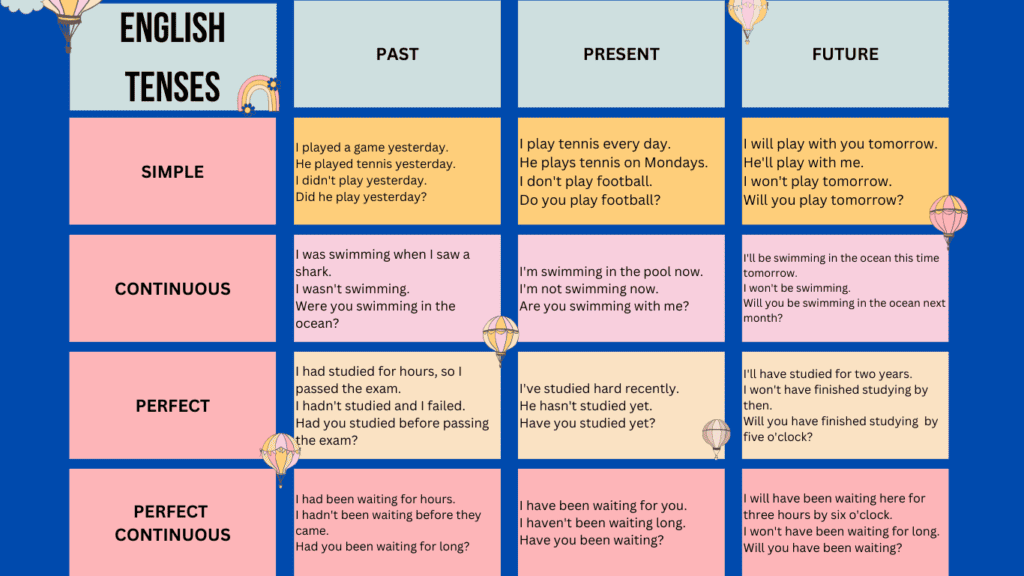
Tenses म्हणजे इंग्रजी व्याकरणातील एक महत्त्वाचा भाग आहे. योग्य tense वापरल्यास वाक्यांचा अर्थ स्पष्ट आणि योग्य होतो. इंग्रजीमध्ये मुख्यतः तीन प्रकारचे काळ (Tenses) असतात:
- Present (वर्तमान) – सध्या चालू असलेली कृती किंवा सवयी.
- Past (भूतकाळ) – भूतकाळात घडलेली कृती.
- Future (भविष्यकाळ) – भविष्यात घडणारी कृती.
Example उदाहरण:
- I eat an apple every day. (Present)
- I ate an apple yesterday. (Past)
- I will eat an apple tomorrow. (Future)
🎯 Types of Tenses and Their Usage | काळांचे प्रकार आणि त्यांचा वापर
1. Present Tense (वर्तमानकाळ)
👉 सध्या चालू असलेल्या किंवा नेहमी घडणाऱ्या गोष्टींसाठी वापरला जातो.
| Type | Example (उदाहरण) | Marathi Translation (मराठीत अर्थ) |
|---|---|---|
| Simple Present | She writes a letter. | ती पत्र लिहिते. |
| Present Continuous | She is writing a letter. | ती पत्र लिहित आहे. |
| Present Perfect | She has written a letter. | तिने पत्र लिहिले आहे. |
| Present Perfect Continuous | She has been writing a letter. | ती पत्र लिहित आहे (काही वेळेपासून). |
2. Past Tense (भूतकाळ)
👉 भूतकाळात पूर्ण झालेल्या कृतींसाठी वापरला जातो.
| Type | Example (उदाहरण) | Marathi Translation (मराठीत अर्थ) |
|---|---|---|
| Simple Past | She wrote a letter. | तिने पत्र लिहिले. |
| Past Continuous | She was writing a letter. | ती पत्र लिहित होती. |
| Past Perfect | She had written a letter. | तिने पत्र लिहिले होते. |
| Past Perfect Continuous | She had been writing a letter. | ती पत्र लिहित होती (काही वेळेपासून). |
3. Future Tense (भविष्यकाळ)
👉 भविष्यात घडणाऱ्या कृतींसाठी वापरला जातो.
| Type | Example (उदाहरण) | Marathi Translation (मराठीत अर्थ) |
|---|---|---|
| Simple Future | She will write a letter. | ती पत्र लिहिणार आहे. |
| Future Continuous | She will be writing a letter. | ती पत्र लिहित असेल. |
| Future Perfect | She will have written a letter. | ती पत्र लिहिलेले असेल. |
| Future Perfect Continuous | She will have been writing a letter. | ती पत्र लिहित असेल (काही वेळेपासून). |
🚨 Common Mistakes to Avoid | टाळण्यासारख्या सर्वसामान्य चुका
❌ अयोग्य: I am eating lunch yesterday.
✅ योग्य: I ate lunch yesterday.
❌ अयोग्य: He will write the letter yesterday.
✅ योग्य: He wrote the letter yesterday.
❌ अयोग्य: She has written a letter tomorrow.
✅ योग्य: She will write a letter tomorrow.
📝 Key Rules for Using Tenses Correctly | योग्य काळ वापरण्याचे महत्त्वाचे नियम
✅ Present Tense:
- सत्य किंवा सवयी व्यक्त करण्यासाठी वापरा.
- Example उदाहरण: The sun rises in the east.
✅ Past Tense:
- भूतकाळात घडलेल्या निश्चित कृतींसाठी वापरा.
- Example उदाहरण: She completed the work yesterday.
✅ Future Tense:
- भविष्यात होणाऱ्या कृतींसाठी वापरा.
- Example उदाहरण: She will visit her grandmother next week.
✅ Continuous Tense:
- कृती चालू असल्यास वापरा.
- Example उदाहरण: He is reading a book.
✅ Perfect Tense:
- कृती पूर्ण झाली असल्यास वापरा.
- Example उदाहरण: She has finished the task.
💡 Advanced Tips | पुढील टिप्स
👉 Time Markers वापरा (Use time markers):
- Present Tense → Now, always, usually, often, every day
- Past Tense → Yesterday, last week, a year ago
- Future Tense → Tomorrow, next month, soon
👉 Continuous Tense मध्ये be verb वापरणे:
- Present Continuous: am/is/are + verb + -ing
- Past Continuous: was/were + verb + -ing
- Future Continuous: will be + verb + -ing
👉 Perfect Tense मध्ये have/has/had वापरणे:
- Present Perfect: have/has + past participle
- Past Perfect: had + past participle
- Future Perfect: will have + past participle
टेन्स चांगला समजून घेण्यासाठी पुढील व्हिडीओ पहा.
🏆 Practice Exercises | सरावासाठी प्रश्न
- He (read) a book every night. (Simple Present)
- They (watch) a movie last night. (Simple Past)
- She (finish) her homework by 8 PM. (Future Perfect)
- We (play) cricket since morning. (Present Perfect Continuous)
- I (visit) my grandmother next weekend. (Future Tense)
🌟 Conclusion | निष्कर्ष
Tenses म्हणजे इंग्रजीतील वाक्यांची रचना योग्य बनवण्याचा पाया आहे. योग्य Tense वापरल्यास तुमच्या संभाषणात आणि लेखनात स्पष्टता आणि अचूकता येते. सराव करा आणि तुमचे इंग्रजी सुधारित करा.
👉 Stay tuned for more English grammar tips on DailyEnglish4U! | DailyEnglish4U वर आणखी इंग्रजी व्याकरण टिप्स साठी संपर्कात रहा!
🌟 Pro Tip:
- Use ‘since’ for a point of time (e.g., since morning).
- Use ‘for’ for a period of time (e.g., for two hours).
- Avoid mixing different tenses in a single sentence unless necessary for context.
📌 Related Posts:
- Common Mistakes in English Grammar
- How to Improve Your Vocabulary
- Best Tips for English Listening Practice
🌍 External Resources:
- BBC Learning English – Improve your grammar with authentic examples.
- Cambridge Dictionary – Look up the meaning and usage of English words.
💡 Conclusion:
Understanding tenses is essential for communicating effectively in English. By practicing the examples and avoiding common mistakes, you can become more confident in using tenses correctly. Keep practicing and improving!
🔎 Tags:
#EnglishTenses #GrammarTips #PresentTense #PastTense #FutureTense
